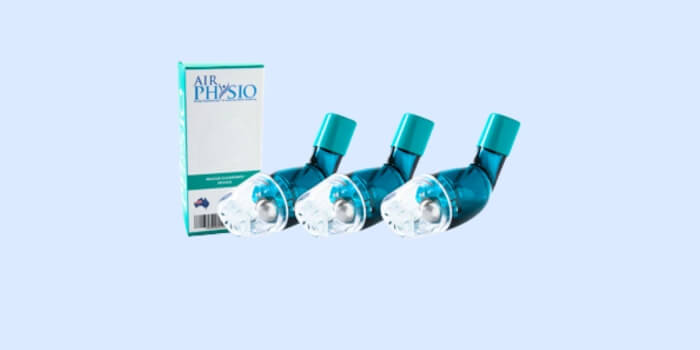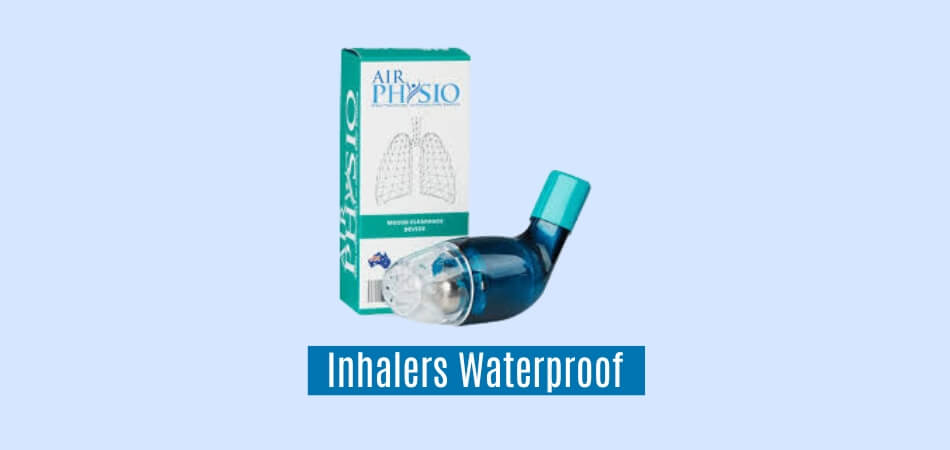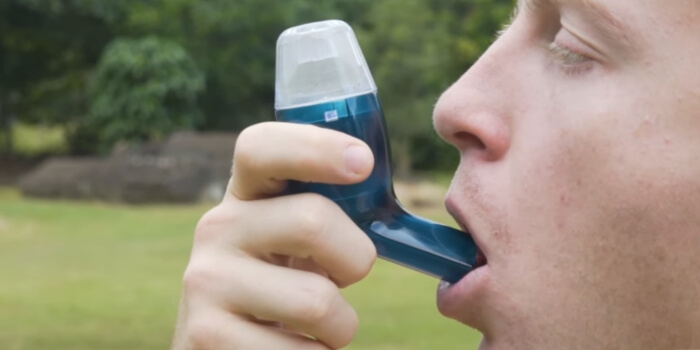Inhalers, those small but mighty devices crucial for many with respiratory conditions, often spark questions about their care and handling. At the heart of these inquiries is one that might seem simple but is of paramount importance: “Are inhalers waterproof?”
This question is especially relevant considering how easily these essential items can find themselves in the path of spills, showers, or unexpected downpours.
The response varies depending on the type of inhaler you use. Metered dose inhalers, commonly known as puffers, can handle getting wet without a hitch.
On the flip side, dried powder inhalers have a no-go zone around moisture. Understanding the difference and the reasons behind it is crucial for anyone relying on these devices for their daily well-being.
So, if you're keen to dive deeper into the dos and don'ts of inhaler care, stick around as we explore this topic further.
Objective of Inhalers
Inhalers play a crucial role for those dealing with respiratory issues. They're like a breath of fresh air, literally, for people struggling to breathe due to asthma or COPD.

To deliver medicine directly into the lungs, offering quick relief from symptoms or long-term control.
Now, when we bring AirPhysio into the conversation, the perspective gets even more interesting. AirPhysio isn't your typical inhaler; it's a device designed to improve lung capacity and health through natural means.
It helps clear mucus from the airways, enhancing the effectiveness of traditional inhaler medication. This synergy between devices like AirPhysio and inhalers underscores a shared objective.
To ensure that each breath taken is effortless and effective. For anyone navigating respiratory conditions, understanding how these tools complement each other is key to breathing easier.
Types of Inhalers
The world of inhalers can seem like exploring a bustling city with its many diverse neighborhoods. Each type of inhaler, like each neighborhood, has unique characteristics and benefits. Let's walk through the main types to get a clearer picture.
Metered Dose Inhalers (MDIs)
Think of MDIs as classic townhouses. They're compact, portable, and deliver medication in spray form. You press down, inhale, and the medication enters your lungs. Simple, they're a go-to for many.
Dry Powder Inhalers (DPIs)
DPIs are sleek, modern lofts. Instead of a spray, they deliver medication in fine powder form. You take a quick, deep breath to get the medication into your lungs. No pressing down is required, but technique matters here.
Soft Mist Inhalers (SMIs)
SMIs are charming bungalows. They produce a fine mist that's easier to inhale than MDI spray. This can be a game-changer for those who find timing the breath with the spray tricky.
Each type has its vibe and serves its purpose in respiratory care. Depending on your specific needs and preferences, one of these neighborhoods might feel like home.
Who Needs to Use Inhalers?
Think of a tool that is so indispensable that it becomes a daily companion for many individuals. That's exactly what inhalers are for a diverse group of people. Let's zoom in on who these individuals are, each with their unique needs and stories.
People with Asthma
Asthma warriors, young and old, rely heavily on inhalers. These devices are like their shields, protecting them from asthma attacks and helping them breathe easier in the face of triggers like pollen, dust, or exercise.
COPD Patients
COPD patients, including those with chronic bronchitis and emphysema, find inhalers invaluable allies. Inhalers help open their airways, making each breathless of a struggle and improving their quality of life significantly.
Individuals with Other Respiratory Conditions
This includes a broad spectrum of individuals with conditions like cystic fibrosis or allergic rhinitis. Inhalers provide them with a way to manage symptoms and maintain lung health.
Inhalers, therefore, aren't just tools; they're lifelines for many navigating respiratory conditions. They stand by their side, offering relief and a chance at a healthier life.
Are Inhalers Waterproof?
Ever found yourself caught in the rain and suddenly thought, “Oh no, my inhaler!”? If you have, you're not alone. Many rely on these little devices to make a big difference in their breathing.

So, let's dive into the question that's probably crossed your mind at least once: Are inhalers waterproof?
Interestingly, the answer isn't a simple yes or no. It actually depends on the type of inhaler you're using.
Metered Dose Inhalers (MDIs)
First up, we have the trusty metered dose inhalers, also known as puffers. An inhaler is what comes to mind when you think of it. They come with a canister fitted into a plastic mouthpiece, and guess what?
They're pretty resilient to water. If your puffer gets wet, it's not the end of the world. Just shake it and let it air dry. The medication inside is safely sealed and won't be affected by a splash or two.
Dry Powder Inhalers (DPIs)
On the other hand, we have dry powder inhalers. These are more like divas when it comes to moisture. DPIs contain medication in dry, powder form that you inhale deeply into your lungs.
The catch? Moisture is their kryptonite. If a DPI gets wet, the powder can clump together, making it difficult to get the right dose when you need it. Keeping these inhalers dry is necessary to ensure their effectiveness.
While metered dose inhalers can take a dip and live to tell the tale, dry powder inhalers need to steer clear of the water. It's all about knowing which type you have and how you should care for it. If you ever doubt, remember:
- For MDIs: A little water won't hurt. Dry it off and you're good to go.
- For DPIs: Keep it dry to ensure your inhaler stays effective and ready when you need it.
You must understand the nuances of your inhaler to effectively manage your respiratory condition. So next time you're caught in a downpour or planning a day by the pool, you'll know how to keep your inhaler safe and sound.
Can Anyone without Asthma Use inhalers?
Yes, but it's not as straightforward as it seems. Inhalers, especially those designed for asthma, should not be taken lightly. While they are specifically formulated for asthmatics, others might use them.

Medical Supervision is Key
For anyone without asthma considering an inhaler, medical advice is crucial. Doctors sometimes prescribe them for conditions like bronchitis or athletes for exercise-induced bronchospasm.
However, using an inhaler without asthma and a doctor's recommendation can lead to unnecessary risks, including adverse reactions or masking underlying conditions.
Potential Risks
It is possible to experience side effects such as an increased heart rate, shakiness, or even a paradoxical worsening of asthma symptoms if asthma inhalers are used without asthma. Understand that these medications open up the airways and, if misused, can disrupt the body's natural breathing regulation.
Even though someone without asthma may technically be able to use an inhaler under certain circumstances, it should never be done without professional guidance. The risks involved highlight the importance of using these powerful tools responsibly and as intended.
FAQs
Inhaler care can raise some interesting questions, particularly regarding maintaining them. Let’s unravel some frequently asked questions that might save you a trip to the pharmacy or, even better, keep you breathing easy.
What Happens if An Inhaler Gets Wet?
When an inhaler gets wet, especially dry powder inhalers (DPIs), the medication consistency can change. This alteration might mess with the dose you inhale, making the treatment less effective or inconsistent. Always keep your inhaler dry and follow the care instructions closely.
Do Inhalers Get Spoilage After Opening?
Yes, inhalers have a shelf life. After opening, an inhaler remains effective for 12 months. However, it's crucial to check the expiration date and any specific storage instructions to ensure it's working as it should.
Can I Use My Inhaler in The Shower?
It's advisable to keep your inhaler out of the shower. Humidity and moisture can affect its functionality, especially if it's a DPI. Keep it in a dry place, and if it gets exposed to moisture, let it air dry before use.
Is It Safe to Store My Inhaler in The Bathroom?
Storing your inhaler in the bathroom isn't ideal due to high humidity levels. This environment can impact medication efficacy, especially DPIs. Keep your inhaler in a cool, dry place away from moisture to keep it in optimal condition.
Final Thought
We've journeyed through the essential query, “Are inhalers waterproof?” and uncovered some vital insights. The answer varies: metered dose inhalers can handle a splash, but dry powder inhalers are more like delicate tech gadgets that don't fare well with moisture.
It's essential to keep them dry to ensure they deliver the right dose effectively. For those on the go, safeguarding your inhaler becomes even more critical. In that case, you can choose a waterproof case or bag when traveling.
This simple step can protect your inhaler from unexpected water encounters, ensuring you breathe easily no matter where your adventures take you.






